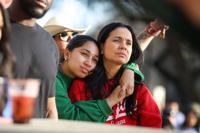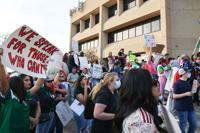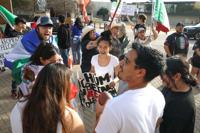
President Donald Trump has made tightening immigration laws a priority since his Jan. 20 inauguration. Working with federal agencies to deport and fine undocumented immigrants and those aiding them is shifting the nation's focus to a new demographic.
Trump has signed over 40 executive orders so far, several targeting different facets of immigration. In some orders and statements, the president used the term “invasion” to explain why he is taking action against undocumented immigrants.
“We have a government that has given unlimited funding to the defense of foreign borders but refuses to defend American borders, or more importantly, its own people,” Trump said in his inauguration speech.
Many of Trump’s key stances on immigration were laid out in Executive Order 14159, “Protecting the American People Against Invasion,” which he signed on his first day in office.
The order declared illegal immigrants “significant threats to national security and public safety,” stating that immigrants are involved in espionage and preparations for terror-related activities.
In other orders, Trump designated cartels as foreign terrorist organizations, established plans to build physical barriers to prevent illegal migration and terminated immigrant parole programs. Additionally, the president declared a national emergency at the southern border.

The new policies have turned the nation into a hotbed for community protest, with growing concerns about U.S. Immigration and Customs Enforcement raids impacting families and children. Texas is a focal point of the conversation, containing 1.6 million of the nation’s 11 million undocumented immigrants in 2022, according to Pew Research Center.
Trump’s administration gave federal officers a national quota to arrest a minimum of 1,200 undocumented immigrants per day, which doubles the highest daily average in the past decade, according to The Texas Tribune.
While the quota has not been met, ICE’s daily reports on migrant arrests show over 800 each day this past week, an increase from last year’s daily arrest averages.
Trump’s orders sparked local communities across Texas to react.

Protesters lined up with the Tarrant County Democratic Party on Sunday at Arlington City Hall, flags of various Latin American countries waving in hand. The crowd was diverse, but each person shared the same goal: “Keep families together.”
Citizens shouted concerns over ICE raids in Metroplex communities. Junior Ezeonu, Grand Prairie City Council member, said over the past decade he’s seen the nation’s leaders stop speaking of unity.
“They’re cascading and trying to discriminate against people based on their skin colors, based on their nation’s origin, based on the way that they got here. Not whether they have a criminal record or not, but on the way that they got here,” he said. “I don’t think that’s how this nation was founded.”
Ezeonu said Trump’s new policies lead to fear in diverse communities such as Grand Prairie, which may have families with undocumented members who have never committed a crime. In the media, they’re seeing law enforcement ask for documentation in simple traffic stops, he said.
“It scares people. It puts them in peril,” he said. “It’s really important for me, as a local city leader, that I provide information and support to those communities.”

As a Nigerian immigrant, Ezeonu said the U.S.’ diversity is a blessing, and immigrants help run our cities, provide services for communities and are important to several sectors of the economy.
“Our diversity is a gift, and it’s an advantage,” he said. “We shouldn’t run away from it. We should embrace it.”
Arlington resident Miranda Limon, 30, came to support her family and friends who made the sacrifice to immigrate to the U.S. She carried a half-Mexico, half-U.S. flag with thumbprints on each side, centered with Virgen de Guadalupe, or Mother Mary, which she said represents all parts of her identity.
“That is my home, these people are my home,” Limon said. “They’re my people. We all deserve to be here. We deserve equal rights.”
@PMalkomes
















